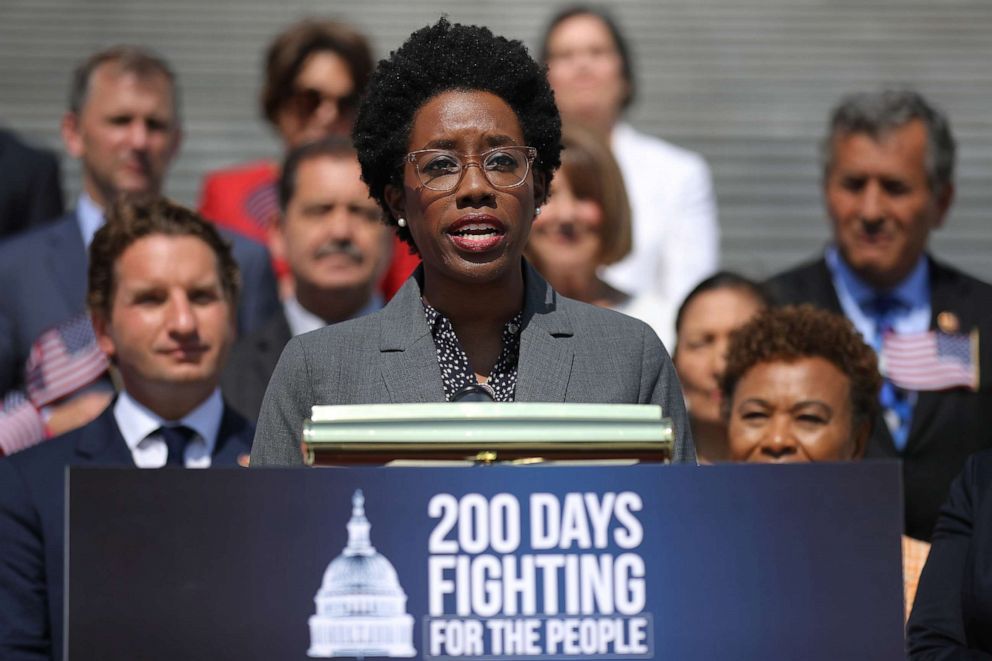After impeachment vote, Trump-district Democrats enter uncharted political territory
For the Democrats who represent districts President Donald Trump won in 2016, deciding to vote for the articles of impeachment -- which passed in the House Wednesday night -- was about defending the United States Constitution.
"I will be supporting both articles of impeachment and honor my duty to defend our Constitution and democracy from abuse of power at the highest level," said Rep. Abby Finkenauer, D-Iowa, leading up to the historic vote.
"In order to uphold my sworn oath, I must vote to protect the Constitution and will vote in support of the articles of impeachment," Rep. Lauren Underwood, D-Ill., said.

"It is with a sense of humility, and with the future of our Constitution and presidency in mind, that I will vote yes on the articles of impeachment before the House," said Rep. Andy Kim, D-N.J.
Twenty-eight of the 31 House Democrats who represent Trump-won districts voted in favor of both articles of impeachment Wednesday. Another, Maine Rep. Jared Golden, split his vote, voting in favor of Article I, which alleged abuse of power by the president, but not Article II, which alleged obstruction of Congress.
Only two of these Democrats -- New Jersey Rep. Jeff Van Drew and Minnesota Rep. Collin Peterson -- voted against both articles.
Of these representatives who voted in favor of impeachment, 21, including Golden, are freshmen members Congress, and some have publicly recognized that this vote could result in them departing Congress as one-term lawmakers.
"The safe thing to do in a district like mine is to vote against the articles of impeachment. But I wasn't elected to do what is politically safe, I was elected to do what I think is right," Rep. Anthony Brindisi, D-N.Y., told ABC News Tuesday.
It's a narrative the National Republican Congressional Committee, the House Republicans' campaign arm, has been pushing hard, blasting emails to reporters after members announced their support for the articles that included statements from spokespeople saying that their vote in December will decide their fate come November.

According to NRCC spokespeople, "Golden’s decision will cost him his job," Finkenauer "will be voted out of office next November," and Oklahoma Rep. Kendra Horn's yes vote "erases any slim chance she had of being reelected next November."
But with so little precedent to reference, the political repercussions of this vote aren't definite. In a recent Fox News poll, registered voters were divided over whether they'd be more likely or less likely to support their representative if he or she voted to impeach Trump, with 38% saying they'd be more likely, 36% saying they'd be less likely, 10% saying it would make no difference and 15% saying they didn't know.
"What we don’t know is the most important thing -- how Trump is doing? Is he winning the election, is he losing the election, by what margin, in what state? So it's really difficult to say," Larry Sabato, the director of the University of Virginia Center for Politics, told ABC News. "I think you can say this much: For these swing-district representatives, the impeachment vote is a riverboat gamble."
Unlike representatives from reliably blue or red districts, Sabato said, these vulnerable House Democrats had an "extremely tough" choice: either vote against the articles and risk facing a Democratic challenger who beats them in the primary, or vote for the articles, win the primary, but then face a general election where the president holds a rally in their district to remind constituents of their vote.
"It won't matter that it was a long time ago," Sabato said. "[Trump will] make sure that the money is spent to defeat you, if at all possible. He won't win every one, but he’ll win some of them."
He added, "For once, I actually believe politicians when they say they're doing what they think is right because nobody knows what's going to be politically helpful for them."
Only twice before has the House voted to impeach a president, and the one time it happened in modern history, to Bill Clinton, the impeached president wasn't also running for re-election. To add to the uncertainty, the entire process is expected to end many months before voters cast their ballots in the Nov. 3 general election.
"Trump himself guarantees that this will not be the issue people today think it will be next November," Sabato said. "I'll bet in November of 2020, impeachment will seem like an eon ago."
"In politics, timing is everything," added former Sen. Heidi Heitkamp, D-N.D. "Everybody has this tendency to think about it as if what happens today is going to be like the topic of conversation in 2020, and I honestly don’t think so.
"The world's going to turn, many more times -- and this will be a footnote," she said.
Heitkamp personally knows the potential outcome a highly publicized vote against the president can have for a Democrat representing a pro-Trump area. She lost her bid for re-election in 2018, just one month after voting against Justice Brett Kavanaugh's nomination to the Supreme Court. With the caveat that it's impossible to know, she said she thinks her vote against Kavanaugh "impacted the margin" on election day.

Cast after women came forward with allegations of sexual misconduct against Kavanaugh, which he's denied, Heitkamp said her vote "wasn't a partisan vote ... [but rather] a vote of conscience." But ultimately, that didn't matter.
"For many people, they were able to exploit that and say, 'She's not independent, she's just going to follow the party line,'" she said. "The spin was this was a partisan vote."
These members, however, have something that Heitkamp didn't: time.
Heitkamp said that as they campaign for re-election, these members have to meet their vote "head on," because despite what many Democrats say about this being a legal or legislative process, impeachment "is a political issue."
"The president's team has spent millions of dollars on paid political advertising, and there doesn't seem to be an appropriate level of response to that amount of political messaging," she said. "And so I think my advice to them is that they spend some resources to explain the vote," and be prepared to explain it "over and over and over again."
Sabato said that if these pro-impeachment Trump-district Democrats make it to the general election, they're going to "stress the examples of bipartisanship that produced actual legislation," or at least passed the Democrat-controlled House.
Some have already done that in their statements announcing their support for impeachment.
"Later this week, I intend to vote for the United States-Mexico-Canada Trade Agreement, a strong bipartisan trade deal that will help Michigan businesses and protect Michigan’s best-in-class workforce," Rep. Haley Stevens said. "I will never stop fighting for the people of Southeast Michigan.”
"This process has not distracted me from delivering real results... Just last week, we passed landmark legislation to allow Medicare to negotiate directly with drug companies to lower the cost of prescription drugs," said South Carolina Rep. Joe Cunningham. "I’m proud of my record as one of the most independent members of Congress and I will continue to work across the aisle to get things done."
Sabato said these lawmakers are "not going to sweep to a second term," but concluded that while some will win and some will lose, "The key thing is -- some win."





